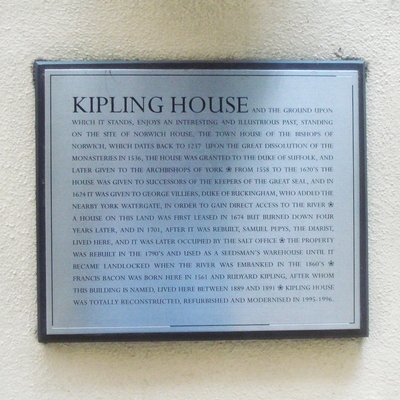British History Online explains "The salt tax, which was unknown in England until 1694, was enforced during the greater part of the eighteenth century. The tax was repealed in 1730, but was reimposed at the suggestion of Sir Robert Walpole in 1732." That page is all about Buckingham Street and refers to The Salt Office being, variously, at numbers 12, 14, 19, over the years 1706-88. This is after York House has been demolished and redeveloped into a number of streets including Buckingham Street.
This section lists the memorials where the subject on this page is commemorated:
Salt Office
Commemorated ati
Kipling House
The wording on the plaque could have been clearer. The first half is giving t...
Other Subjects
First Pizza Express
Founded in 1965 by Peter Boizot, Pizza Express opened its first restaurant in Wardour Street. Inspired by a trip to Italy, Boizot brought back to London a pizza oven from Naples and a chef from Sic...
Albion Mills
Corn mill built by Matthew Boulton, James Watt and John Rennie. Rennie moved from Scotland to London when invited to work on the construction of these Mills. Burnt down in 1791 and Spitalfields L...
West Middlesex Water Company
A utility company which supplied water to parts of West London. It was established in premises on the banks of the River Thames at Hammersmith, the central part of which was designed by William Tie...
Committee and Friends of the United Kingdom Band of Hope Union
Hope UK is a Christian charity based in London which educates children and young people about drug and alcohol abuse. Local meetings started in Leeds with the objective to teach children the impor...
Admiral Duncan pub bombing
Well known as a gay pub, the Admiral Duncan was the site chosen by Neo-Nazi David Copeland to detonate a nail bomb which killed three people and wounded 70. Copeland, who was also responsible for ...
Event, Commerce, Community / Clubs, Food & Drink, Gender Issues, Terrorism, Tragedy







Comments are provided by Facebook, please ensure you are signed in here to see them